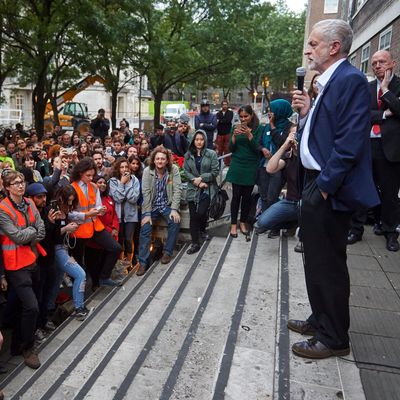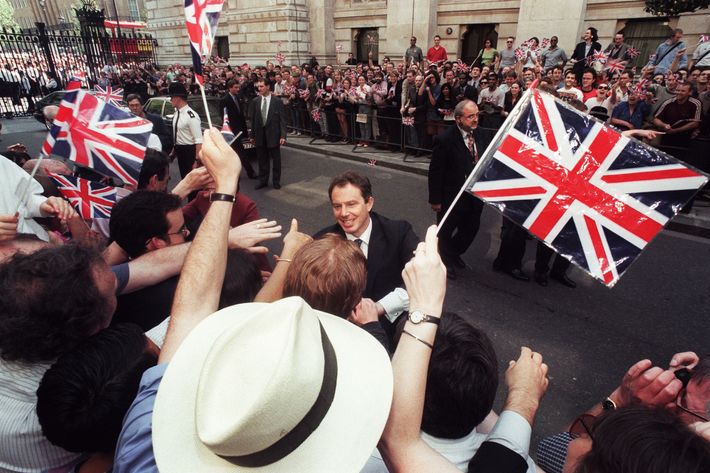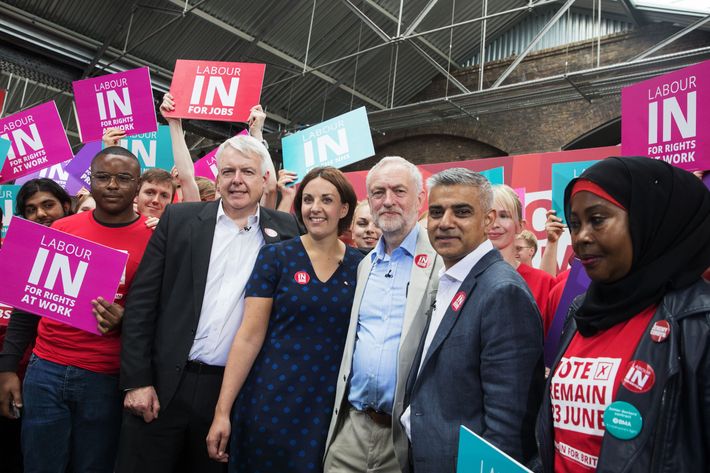
Britain’s Labour Party did not ask for an EU referendum. They did not call it. The vast majority of them did not campaign for a Leave vote. Around two-thirds of their supporters voted for Remain. And their left-wing leader, Jeremy Corbyn, did not quit as soon as Remain lost, like Prime Minister David Cameron. Cameron’s exit has triggered a Conservative leadership election, which is proceeding with that party’s typical levels of shock and treachery. But for all the surprise of Boris Johnson quitting the race this morning, their dose of chaos is nothing close to the maelstrom Labour have leaped into.
While Conservative leaders were shunning the airwaves and passing the buck on whose job it is to deal with the spiraling mess, Labour MPs have queued up to resign publicly from any post they can, culminating in a vote of no confidence in Corbyn in which he was slaughtered, with 172 MPs rejecting his leadership against 40 supporters. With 80 percent of his parliamentary party against him, has Corbyn stepped down? Certainly not. He’s dismissed the vote and hunkered down for what is going to be a brutal fight. Corbyn is confident he still has the overwhelming support of Labour’s membership outside Parliament, whose ranks swelled last year to vote him into the post. He may be right.
As a Labour member myself, it seems grotesquely badly timed and unfair that we are the first of Britain’s political institutions to be torn apart by the Brexit black hole. No doubt we won’t be the last. But Labour did play a part in getting the country here, and the electoral strategies they employed created — or failed to heal — some of the conditions for Brexit. The instability in Labour is not a consequence of Corbyn or even his enemies: it’s born out of the way Brexit brutally exposed, for perhaps the final time, the incoherence of Labour’s electoral coalition.
The Trouble With Blairism
To understand what’s happening now and what’s going to happen, we have to look back. For most of its history, Labour broadly represented the working classes in Britain, while the Conservatives represented the middle and upper classes. After the war, both parties occupied a broad consensus around state planning and welfare, which lasted until the economic crises of the 1970s. By then Labour’s left and right wings existed in constant tension. After losing power to Margaret Thatcher’s Conservatives in 1979, this became open strife, until the party split in 1981, with Europhile centrists breaking off to form the Social Democratic Party. The result? A brutal electoral defeat for both new and old parties in 1983. The era is crucial because it explains why horror of splits is in Labour’s DNA, which in turn explains why neither Corbyn’s diehards or the rebels will take the step of breaking a dysfunctional party apart.
Margaret Thatcher’s 1980s ascendancy pulled all of British politics to the right, the Labour Party included. Tearing up the postwar consensus, her policies hammered employment and community ties in Labour’s heartlands in the North of England. Opposing Thatcher felt righteous. But it also felt futile, as the Tories racked up win after election win. Labour needed someone who could win elections: In 1994 they found Tony Blair. Blair won elections, all right — three in a row, with two massive majorities and one very workable one.

He did it by making a calculation that is now coming back to haunt modern Labour. The working class in the South outside London had been seduced by the Tories, and the working class in the North had been crushed by them. Blair calculated that the core, traditional Labour vote in the North had “nowhere else to go,” and he aimed instead at winning back Tory and swing voters in the South with a pro-business attitude, putting a Thatcherite gloss on a social-democratic agenda.
It worked, handsomely. Some of his policies, on education and health, benefited the traditional Labour vote. Others left many northern voters far less happy. First among those was immigration, which had begun to rise even before Eastern European countries joined the EU in 2004 and their workers gained freedom of movement within it. Many “old Labour” voters felt like they weren’t asked about any of the policies, and they resented that. But to the Blairites that didn’t matter, if they turned up and voted.
Undeniably, this was a brilliant way to win elections. But it was not a sustainable one. In the 2015 election, Labour endured worrying swings to the nationalist UK Independence Party (UKIP) in the northern heartland, handing some seats to the Conservatives. And if 2015 didn’t convince, 2016 has sealed the deal, with Labour’s traditional northern stamping grounds voting heavily for Leave.
So this is why the solution for Labour isn’t simply “Blairism.” Blairism isn’t a philosophy; it’s a strategy — one that relies on a compliant working-class vote underwriting an appeal to the middle class. Without the former, what you’re doing isn’t Blairism as the Labour Party understood it.
The Trouble With Labour
So simply ditching Corbyn and restoring a Blairite won’t work. But will anything else? The obvious strategy is “win back the traditional Labour vote.” This has usually been characterized as moving Labour sharply to the right on immigration, patriotism, and traditional values that “Blue Labour” strategists like Jon Cruddas believe are the issues that are losing them their northern heartlands. This is sometimes characterized as “Blairite.” But that’s not strictly accurate — Blair and Gordon Brown’s New Labour did try that, clumsily and unconvincingly, in its latter days, but in the sunshine years Blair’s Labour was a lot more pro-multiculturalism and pro-immigration.
In a funny way, though, winning back the North is a Blairite strategy, because it involves the same conjuring trick. You appeal to a lost bloc of voters while presuming your current bloc will fall into line. This time, the current bloc is Labour’s second heartland: London and other big English cities, which are solidly Labour and mostly voted Remain. The coalitions of multicultural and socially liberal voters that defined London Labour politics since the ‘80s have bloomed into a powerful group of Labour voters, watered by continual investment during the New Labour years.
Could their votes be counted on if Labour swings right to win back UKIP voters? This is a bloody big gamble, especially as the de facto spokesman for metropolitan Labour right now is the very popular London mayor Sadiq Khan, a Muslim son of a bus driver who has found himself the face of British diversity in the teeth of Brexit. Khan is a great old-school city politician, a presser of flesh and juggler of allies, who won’t be directly involved in any leadership race but could have a mighty influence on its direction.
And here is Labour’s awful dilemma. It’s a party with two hearts: its huge but declining vote in the postindustrial North and Wales, and its vote in London and England’s other big, cosmopolitan cities, which is solid, if not growing, but can’t come near to winning it power by itself.
The solution seems obvious: Find a leader, and a strategy, that appeals to both of these hearts, and then reach out to the rest of England. But no such strategy is possible, and the Brexit vote made that horribly obvious. If you had designed an issue to expose that Labour’s two hearts disagree with or even detest one another, you couldn’t have picked a better one.
Brexit split the country clean down the middle, and sliced each party into chunks. But it hit Labour particularly hard. A post-vote poll tells us that the areas on which Leave and Remain voters most fundamentally disagree are multiculturalism, social liberalism, and immigration (Leavers feel they’re a “force for ill,” Remain a “force for good”). But these are exactly the issues that keep haunting Labour on their northern doorsteps. To ignore them is to cut out the party’s old heart. To address them is to betray the new heart. And such a betrayal would be monstrous at a time when racist violence and abuse is showing a sharp rise and the far right is on the march. It would be throwing the victims of that violence to the wolves.
As long as that division remains, Labour does not feel like a viable party, no matter who leads it.

The Trouble With Corbyn
Even so, it matters who leads it. Jeremy Corbyn represented a different way of cutting Labour’s Gordian knot: win over old voters, young voters, and non-voters, and heal the divisions with progressive economic policies, social liberalism, and a stand against Conservative austerity. Then wait for the Tories to fuck up. It was a good strategy, perhaps the best available after Labour’s big defeat in 2015 given the underlying tensions in the party. There is even some evidence it might have worked. A backlash against Tory austerity was growing. The Tories’ poll lead was slipping, even though Labour’s ratings were flatlined. Corbyn was even, fleetingly, less disliked than David Cameron. Then came Brexit, and the ruin of all plans.
Corbyn’s lackluster performance for the Remain campaign has sparked criticism among activists and MPs, amid rumors — sourced by someone who spoke to someone who spoke to him in a tapas bar — that he voted Leave anyway. It’s the last straw for the parliamentary party, who have spent nine months chafing under his leadership, appalled at the way he surrounded himself with fellow hardliners. Corbyn has been a poor communicator and at best an erratic strategist, say his enemies. He has been monstered in the media and briefed against by his MPs, say his friends. All true. But Corbyn’s campaigning is also an excuse — Brexit has changed the political landscape so quickly that for Labour MPs the idea of giving Corbyn time has become an unaffordable luxury.
Two things in particular have shifted. First, even if Labour solves its two-hearts problem and regenerates itself, it still has to win back new votes to return to power. A promised surge of young and lapsed non-voters didn’t materialize for the referendum, and now seems like a chimera. That leaves the Tories. The most likely Tory voters to move over are now worried Remainers who want their quiet, comfortable life back. Labour rebels calculate that Corbynism holds no appeal for these folk.
And second, even bullish Corbyn supporters knew reshaping the party was a long-term project, with the next election scheduled for 2020. But, post-Brexit, the long term has evaporated, and the unit of time in British politics has become the hour, not the month or year. There is talk now of a potential snap election in October, and the no-confidence vote proves 80 percent of Labour MPs are desperate to see someone besides Corbyn leading the party.
Now What?
What on Earth happens next? There are four possibilities ahead. A new leader, a split, both, or — somehow — neither.
A New Leader: Corbyn either resigns — unlikely, as dogged refusal to compromise is his watchword — or loses a leadership battle. Anecdotally, a lot of members who joined to support him feel disappointed, and Brexit has been a huge blow to the young voters who were on his side last year. But he still has a position of massive strength in the membership and would annihilate a challenger from the Labour right, as, whether or not their loyalty to Corbyn himself was misplaced, it’s undeniable that members old and new alike wanted a leader who would push left-wing policies forward. A one-on-one battle with someone popular on the left might conceivably finish him, though — the current likely candidate is Angela Eagle, the party’s former business spokesperson, barely known outside Westminster, but compared by admirers to Angela Merkel. A defeat for Corbyn by party members in a leadership contest would be rancorous but looks like the best way for Labour to somehow remain formally unified going into any snap election.
A Split: But what if Corbyn wins the leadership contest? He has lost Labour MPs, whose support he needs to be remotely effective in Parliament. But he has the backing of most of the unions — Britain’s organized labor, still the party’s main source of funds. And he has a wild card: the vocal and energetic Momentum movement, built by his left-wing supporters as a separate organization outside the Labour Party, and despised as a Trojan horse by many MPs. Following the meeting of MPs this week at which Corbyn was widely denounced, he walked out to address a Momentum demonstration, as rapturous as his MPs were hostile. At this point, some kind of schism looks inevitable, and with Corbyn unshiftable at the top of Labour, it would involve an exodus to the center. It really can’t be overstated how much Labour MPs want to avoid a division like this — the 1981 split, and its consequences, are etched on the bones of the Labour movement. But they may not have a choice — a Corbyn win would embolden his allies to turn on the rebels and attempt deselection of MPs, jargon for a Corbynite purge of the Labour Establishment. This would be a far bloodier form of split, consigning Labour to a bear pit of infighting without end. The rebels may feel it’s better to jump than be putsched.
Where might they go? Crisis points are boons for opportunistic centrist politicians as much as those at the extremes, and the 16 million who voted for Remain and may fear calamity are a tempting electoral prize. A post-Labour centrist party could make a “clean up the mess” pitch, resurrecting the Blairite strategy one more time and positing themselves as safe managerial hands, maybe even luring a few centrist Tories in, too. Such technocratic governments have popped up in other EU states at moments of crisis, though, tellingly, they’ve sometimes been imposed from above, not voted in. And this notional centrist group would still run into Labour’s two-hearts problem, risking the final and tragic severance of Labour’s historic roots as a working-class party, the logical endpoint of Blairism.
A New Leader and a Split: The rebels aren’t the only ones who can split the party. Thanks to ambiguous rules, there is some doubt as to whether Jeremy Corbyn will even be on the leadership ballot in any election, as he might need 50 MPs to nominate him — 10 more than his support in Tuesday’s vote. If that happens, the leadership race is blown open, and the party’s left and right wings can fight it out with no more need for a unity candidate. But the party membership and Corbyn’s supporters will feel betrayed and go into meltdown. Corbyn has spent his life as a Labour MP fighting his party, but the pressure will be intense to quit and turn Momentum from a pressure group into a new left-wing party, leaving a wounded Labour to fight for the center, and opening up ground for the Tories to present themselves as the unified, commonsense bulwark against the far right. Like most scenarios, this also seems disastrous for Labour.
No New Leader, No Split: Corbyn wins the leadership battle, and the rest of the party hunkers down and works with him? No, that isn’t going to happen again. The manner in which Corbyn’s shadow cabinet quit, and the scale of the vote against him, makes that obvious. But remember how much Labour loathes the idea of schism. The rebels are now apparently floating the idea of a “party within a party.” This might involve seizing the name Labour, choosing a new leader without Corbyn, and asking for this new leader and their team to be recognized as the parliamentary Opposition to the Conservative Government. There may be arcane Labour bylaws that legitimize the idea that the leader of the Labour Party inside and outside Parliament can be different people. But only politicians whose dread of splits is pathological would see this as anything approaching a viable concept, judging by how badly it would confuse the voters. It would turn the Labour Party into something like the medieval papacy, with different popes at Rome and Avignon. But popes don’t have to win democratic elections.
All of these options will be ghastly and divisive. None of them seem likely to put Labour in a position to defeat the Conservatives, whether the election is in October or in 2020 — even though Brexit was a Tory idea and the calamity is covered with Tory fingerprints. This week’s civil war among Labour’s MPs, plotted on WhatsApp as a snap response to Britain hitting the political iceberg of Brexit, is a showdown everyone in Labour knew was coming eventually. Its timing seems arbitrary, but is really inevitable, because of the way Brexit just exposed, again, the huge chasm in the Labour vote and values. And the worst thing is, none of the bad options available will do anything to close that chasm. Labour’s two hearts are close to failure.





























